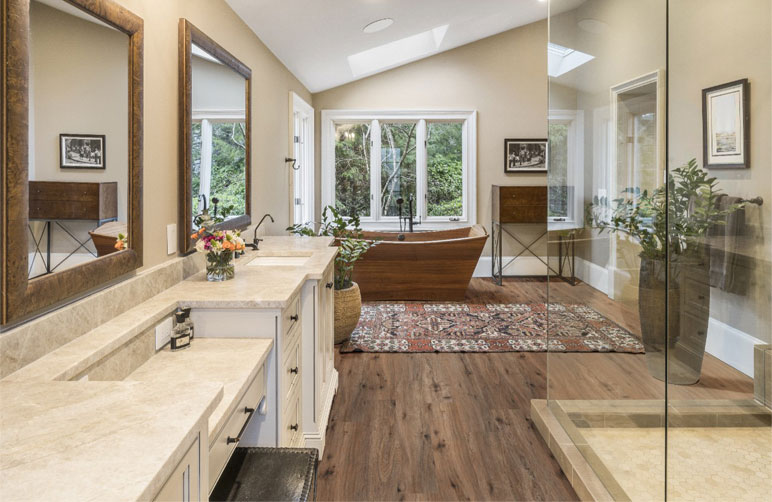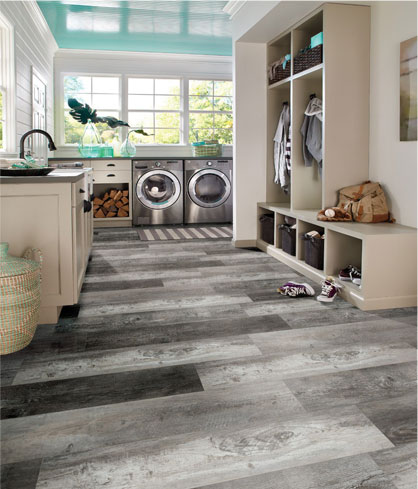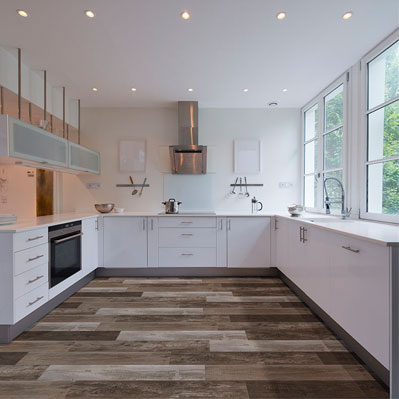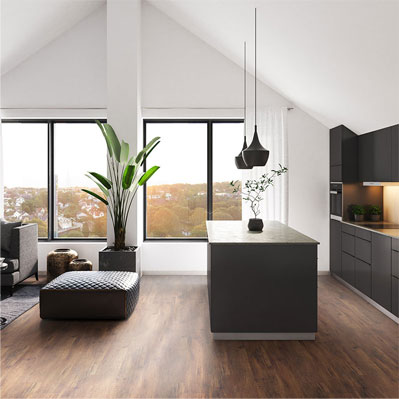Luxury Vinyl Plank Vs. Luxury Vinyl Tile
If you're considering taking the plunge by installing popular and on-trend modern luxury vinyl flooring in your design, you might have noticed the many mentions of luxury vinyl tile (LVT) and also lux ... Read More
Choosing the right flooring material to suit your lifestyle and style is crucial, but with so many choices, it can be challenging to weigh all your options. In today's market, one type of flooring that has taken hold for both home and commercial spaces is luxury vinyl flooring (LVF). And it's not surprising; after all, LVF is durable, easy to maintain, and offers many gorgeous looks, including realistic natural stone and hardwood.
If you're considering taking the plunge by installing popular and on-trend modern luxury vinyl flooring(LVF) in your design, you might have noticed the many mentions of luxury vinyl tile (LVT) and luxury vinyl plank (LVP) flooring. This article explains how these two varieties of luxury vinyl flooring are similar in composition and benefits, how they differ, and which one is best for your project.
Luxury vinyl tile (LVT),luxury vinyl plank (LVP), and luxury vinyl flooring (LVF) are all synonymous terms. They are the same.

Whether you're building a new home or updating your existing space, luxury vinyl tile (LVT) and its close relative – luxury vinyl plank (LVP) – are both great options. The question is, which one is right for you? And what's the difference? To begin with, they do share many characteristics, so you're not entirely off base if you think they are the same. However, there are a few differences – big and small – between these two flooring materials.
LUXURY VINYL PLANK VS. LUXURY VINYL TILE
With luxury vinyl flooring, you can choose wood look luxury vinyl planks or luxury vinyl tile featuring natural stone looks.
The operative word in luxury vinyl planks (LVP) is, of course, "plank." Because of its elongated board-like shape, LVP accurately mimics the look of hardwood flooring, providing even the realistic scraping or embossing you would expect. In contrast, luxury vinyl tile (LVT) comes in square or rectangle tiles and features the look of concrete, stone, and other traditional  Vinyl Flooring LVT Vs LVP materials. Some LVT flooring even includes surface texture or can be installed with grout to evoke the natural stone look. Since LVT and LVP are manufactured the same, they are similar except for their floor look and shape.
Vinyl Flooring LVT Vs LVP materials. Some LVT flooring even includes surface texture or can be installed with grout to evoke the natural stone look. Since LVT and LVP are manufactured the same, they are similar except for their floor look and shape.
Both types of vinyl flooring are composed of several layers, including a protective wear layer, a print layer that displays the color and design, and a core of PVC. One optional layer that some types of LVT and LVP may include is a comfort and quietness backing that is available in various thicknesses.
And while LVP features a variety of hard-wood looks and LVT often features natural stone looks, that's not the whole story. LVT can also realistically give you the look of any number of materials, from patterned ceramic to fabric, concrete to bamboo. The sky's the limit when it comes to bringing your design dreams to life with LVT, and the amazing technological advances behind the realistic print layer mean that this modern marvel is the farthest thing from the tacky vinyl of days gone by. Luxury vinyl tile has truly entered the modern era!
WHAT ELSE DO LVT AND LVP HAVE IN COMMON?
Quite a bit, actually. For example, if you've started pricing out different flooring options, you already know that hardwood and natural stone can be expensive. Luxury vinyl flooring (LVF) is affordable in comparison and can end up saving you a lot while still giving you the look you want. In addition, LVT and LVP are relatively easy to install as a DIY, saving you a lot of money in a remodel or build.
 In addition to the cost savings, there are other LVF benefits to consider. For example, LVT and LVP are durable and can handle your busy, messy life, so you won't constantly worry about scratches, spills, cracks, or dents in your expensive hardwood or stone tile. Plus, luxury vinyl flooring is a softer place to fall for toddlers and is super easy to keep clean. Finally, one of the many characteristics of LVT and LVP flooring is its water-resistant or waterproof qualities. Both wood and stone can be vulnerable to moisture and spill, but luxury vinyl flooring performs like a champ in kitchens, bathrooms, basements, mudrooms, and more. There's no indoor room where LVT or LVP isn't appropriate.
In addition to the cost savings, there are other LVF benefits to consider. For example, LVT and LVP are durable and can handle your busy, messy life, so you won't constantly worry about scratches, spills, cracks, or dents in your expensive hardwood or stone tile. Plus, luxury vinyl flooring is a softer place to fall for toddlers and is super easy to keep clean. Finally, one of the many characteristics of LVT and LVP flooring is its water-resistant or waterproof qualities. Both wood and stone can be vulnerable to moisture and spill, but luxury vinyl flooring performs like a champ in kitchens, bathrooms, basements, mudrooms, and more. There's no indoor room where LVT or LVP isn't appropriate.
One last benefit of LVP and LVT flooring is that it is straightforward to care for. With simple vinyl flooring care and maintenance, such as regular sweeping or vacuuming (turn off the beater bar) and the occasional damp mopping with warm water, your floors will look new for years to come. Of course, it's never a good idea to use strongly abrasive cleaners on any floor, and luxury vinyl is no different. Instead, a bit of white vinegar in your water should do the trick if you need a deeper clean. As with any floor, clean up spills as soon as you see them, but we all know that sometimes a spill goes unseen for hours. Fortunately, luxury vinyl flooring can handle most spills. If you find that a tile sustains damage, you can pop it out (if not glued down) and replace it.
HOW ARE LVT AND LVP DIFFERENT?
One thing that sometimes sets LVT and LVP apart from one another is their different vinyl installation methods. Both can come in either flexible glue-down luxury vinyl or rigid core click-lock and easy-install luxury vinyl. As the name suggests, glue-down luxury vinyl flooring is affixed directly to the subfloor, which may mean that they are not as water resistant (depending on the adhesive used) and are not as easy  to repair as the rigid core option. Rigid core click-lock and easy install LVT or LVP comes in individual tiles or planks that click together to create a seamless seal, and these are easier to repair as they can be "un-clicked" to remove and replace a damaged tile or plank as needed. That's why it's a good idea to purchase extra material in case of repairs down the road.
to repair as the rigid core option. Rigid core click-lock and easy install LVT or LVP comes in individual tiles or planks that click together to create a seamless seal, and these are easier to repair as they can be "un-clicked" to remove and replace a damaged tile or plank as needed. That's why it's a good idea to purchase extra material in case of repairs down the road.
Some homeowners and even business owners opt for glue-down luxury vinyl because it works well for large installations in high-traffic areas. However, it's trickier to install glue-down vinyl since you must cut it to fit exactly right. Since there's less margin for error, it's probably best to hire a professional if you choose a luxury vinyl flooring material. However, even with the cost of a professional installation, glue-down vinyl is more cost-effective than floating-click planks and tiles, so the price should still be very reasonable.
Starting your lvt or lVP project
With its durability, easy maintenance, and cost-effective price point, you can't go wrong with luxury vinyl flooring. This flooring is a winner because of its many designs, looks, and versatility for moisture-prone and even high-traffic areas. And while hardwood and natural stone can be a bit of a headache in terms of maintenance and worry, luxury vinyl tile LVT and luxury vinyl plank (LVP) flooring are easy to keep looking like new for years to come. So, check out our many luxury vinyl flooring, and start your project today!